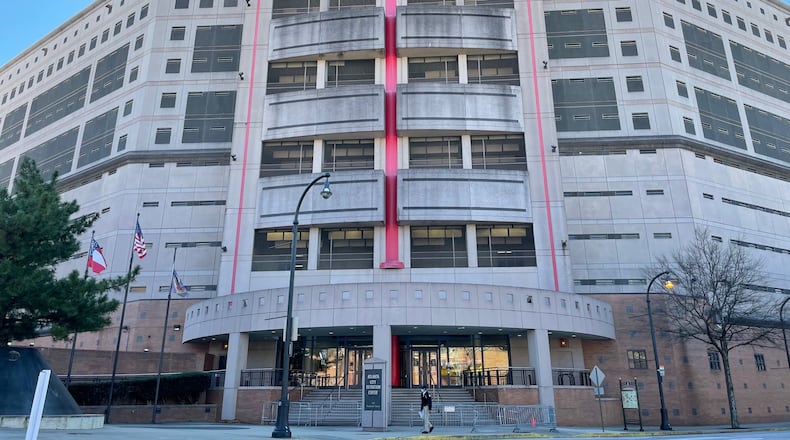Construction is officially underway in downtown Atlanta for a new 24/7 resource center to address homelessness, mental health challenges, substance abuse, and poverty.
Next year, part of the mostly-empty Atlanta City Detention Center will become the Center for Diversion and Services — a place where police can send people associated with non-violent offenses instead of booking them into jail on Rice Street. Representatives in Atlanta, Fulton County, and the Policing Alternatives & Diversion Initiative (PAD) celebrated the occasion Friday by taking turns with sledgehammers on a detention center wall.
Atlanta cops traditionally had only three options for non-violent offenders: send them to Fulton’s perpetually over-crowded jail, take them to Grady Hospital if they need medical help, or do nothing.
But Grady Health System, the center’s lead operator, will now offer participants immediate access to showers and hot meals. Anne Hernandez, Grady’s vice president of behavioral health, said certified peer specialists will also determine if participants require laundry, health care, sobering rooms, case management, or other necessities.
The center, proposed in 2021, is a milestone for what began as the 2017 PAD pilot program. And now, the citywide program has helped Atlanta police divert 319 people from arrests since last year.
“It’s what we’ve been dreaming of for years,” said PAD Executive Director Moki Macías.
The center’s construction is one of the first projects underway within the city’s “Moving Atlanta Forward” infrastructure plan. Last year, voters approved $750 million in TSPLOST funds and two bonds for the plan. The city says $8 million from that package is going into the center.
Atlanta Mayor Andre Dickens said he’s glad there are alternatives other than jail for people in need of a second or third chance. City Councilman Dustin Hillis said the center will resolve issues police aren’t equipped to address. Retired Atlanta Municipal Court Judge Clinton E. Deveaux called the center “a dream come true.”
“The diversion center will serve a great purpose in making sure we collectively attack those other social ills that for some reason or another have become a part of the criminal justice system when they shouldn’t be,” said Fulton County Commissioner Khadijah Abdur-Rahman.
Coincidentally, the center’s groundbreaking comes as Fulton and Atlanta collaborate to house 700 county detainees in empty beds elsewhere at the detention center. Some leaders present want to use the entire facility to help alleviate Fulton jail overcrowding. Others want to turn the full building into a pre-arrest diversion and community resource center.
“This building must suffer from schizophrenia,” said Fulton County Superior Court Judge Robert McBurney. “It is about to embark on its biggest moment of split personality as it currently houses 300 female inmates who are county inmates.”
However, McBurney also said there needs to be a space for people in need because he lacks the tools to counsel people three months after they’ve been arrested for an initial court appearance.
Credit: Miguel Martinez
Credit: Miguel Martinez
City Councilman Michael Julian Bond said he hopes they’ll find another building for the center.
“We appreciate all our partners, but we know in some people’s minds they’re still coming to this ‘location,’” said Bond as he air quoted his last word.
Devin Franklin from Southern Center for Human Rights also lauded the regional partnership. But, in reference to the detention center’s jailing and the ongoing construction of a police training center across forested land in DeKalb County, Franklin also said he “can’t help but be reminded that there’s still a great deal of harm being caused and will continue to be caused,” unless everyone finds the common ground to resolve it.
Ultimately, residents like Lashundra Mitchell say PAD offers life-changing resources. She spent 14 days in jail after being booked with failure to appear in court for a misdemeanor charge in 2021. She lost everything — including her clothes, birth certificate, social security card, and ID.
“PAD helped me get everything that I needed, including housing,” said Mitchell, 29. “I’ve been in my apartment since November.”
About the Author
Keep Reading
The Latest
Featured



